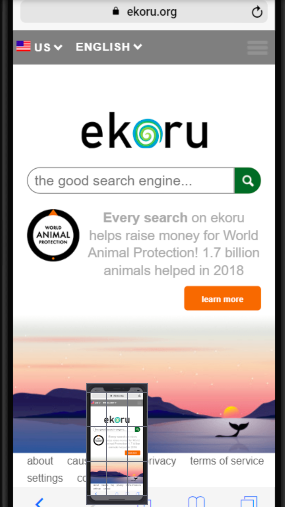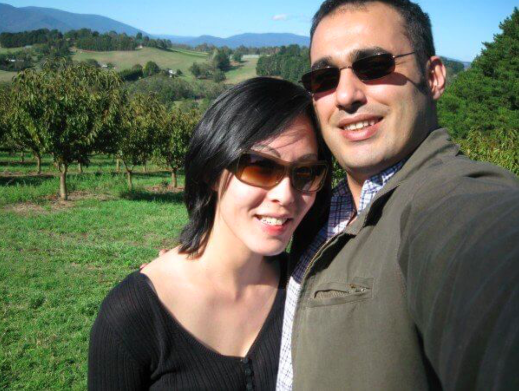
He has always wanted to escape civilisation and recede into nature at every opportunity he got, for he was perturbed about the ill-treatment inflicted on the environment by human beings.
“Plastic rubbish at the peak of a Borneo mountain, mounds of trash in the middle of the Simpson desert, and litter washed up and strewn across the beaches of Southeast Asia, the humankind leaves traces of themselves everywhere, even in the most remote places,” said Ati Bakush, a nature lover and avid traveller from Australia.
“I’d reached a point in my life with four young children where I began to question what sort of legacy and future our generation is leaving behind. I decided to use my skills in software to develop a solution with a mission to help the planet. Ekoru is the result of this goal,” he added.
Located in Kula Lumpur, Ekoru is a search engine alternative to Google, which donates a part of its revenue to partners involved in ocean cleanup.
“During my professional career, I was involved in the development of search engines for mobile operators in Southeast Asia and Latin America. While working on these projects, it occurred to me that I could be applying the same skills and knowledge for the benefit of the environment instead of profiting a large corporation,” he said, sharing the story behind the starting of the venture.
Also Read: The Capture app enables you to track, reduce and offset carbon emissions from everyday life
At Ekoru, he is supported by his wife Alison Lee (Communications Director). A team of supporting developers and designers in countries such as the UK, Sweden, the US, and Indonesia also participate in the initiative from remote locations.
Bakush and team were initially looking to work with multiple environmental causes but settled on the health of the oceans as it’s becoming increasingly important.
“The effect of human impact and climate change isn’t just about rising sea levels, but increased temperatures, the sufferings of marine animals, reduction and contamination of our food supply, carbon absorption and a myriad of other issues. The health of an ecosystem which covers 70 per cent of our planet and contains 97 per cent of our water should be at the forefront of everyone’s mind,” Bakush stressed.
 Ekoru V/s Google
Ekoru V/s Google
Ekoru works just like any other search engine and makes money from the sponsored links which appear above the search results.
Ekoru’s USP is that 60 per cent of its total revenues go to its clean oceans partners, such as Big Blue Ocean Cleanup, whose mission it is to clean coastal and marine environments. “This allows users to help our oceans while they search and surf the Internet every day,” he noted.
The search engine works on any mobile, tablet, or computer browser. An Android mobile search app is already available, with the iPhone version to be launched soon.
All the searches are private, and no information about searches is stored. Every search is also encrypted to keep user data away from prying eyes.
The search engine is available in three languages — English, French, and German.
The startup is currently in touch with some schools and educational board about introducing Ekoru as the default search engine for classroom computers and devices.
“We’d like as many students as possible to learn about the importance of our oceans and helping conserve them while they research their school work,” he said.
Who does Ekoru compete with?
“We take the view we’re competing only with Google and not other search engines — it’s an unprecedented situation where one company has managed to achieve a comprehensive stranglehold/monopoly/dominance in a single vertical. The upside of this is that there is an enormous amount of room for everyone else to grow at Google’s expense,” he smiled.
Green energy-powered servers
Ekoru’s servers are located in green data centres powered by hydro-electricity. This minimises the carbon footprint on the Internet and ensures that every web search is as green and eco-friendly as possible.
“Finding a data centre for Ekoru’s servers that are 100 per cent green was, however, challenging. After an intense hunt, we discovered OVH, whose Beauharnois data centre in Canada is powered entirely by hydro-electricity. It uses water-cooled servers with no fans and uses thermal air convection in their buildings instead of air-conditioners,” he said.
“Having our servers powered by green energy was a top priority for us. The Internet’s C02 footprint is a hidden problem with data-centres around the world, consuming vast amounts of energy to power servers and air-conditioning,” he shared.

Ekoru Founders Ati Bakush and Alison Lee
The Ekoru project is primarily self-funded in addition to an initial investment from private investors.
When asked about Ekoru’s fundraising plans, Bakush quipped: “It’s a bit hard to write a fundraising pitch when the first slide promises to give away 60 per cent of the revenue. At the moment, we hope we can continue to grow organically with the support of a growing userbase. Organic growth has the benefit of being free of any external pressures, meaning that we are only responsible for our users.”
The post One search equals to minus one pound of sea garbage: Here comes an ‘eco-friendly’ search engine appeared first on e27.